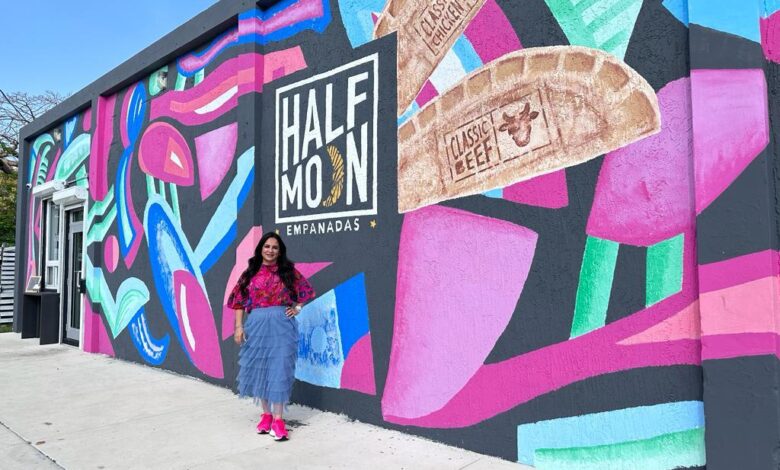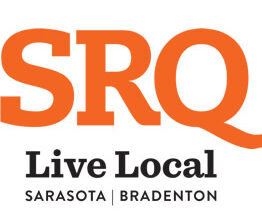Half Moon Empanadas founder Pilar Guzman on her chain’s success, including at U.S. airports

Pilar Guzmán likes to go over the details of her business. Her eyes shine when she talks about her empanadas, and she lights up when she remembers how Half Moon Empanadas went from a single-store project to a chain in various U.S. airports, delighting travelers from all over the world with her tasty empanadas.
“Our empanadas are the best on the market,” said Guzmán about the pastries that are at the center of the business she developed with co-founder Juan Zavala. The key to their success, she said, is paying attention to the details throughout the process, which starts with making their own dough.
Since 2008, when it started at a location in Miami’s South Beach, Half Moon Empanadas has expanded to over 20 locations, including airports in Miami, Denver, Fort Lauderdale, Nashville, Chicago, Phoenix, Palm Springs and Minneapolis, as well as in universities and hospitals in Florida.
In 2023 alone, the company sold three million empanadas. Guzmán was recently featured in Inc. magazine’s 2024 Female Founders 250 “most intriguing” entrepreneurs.
“The weight of our empanada is four ounces, when most others have half that. You cut one of most empanadas and there is air. You cut one of our empanadas and there is product,” she says with an air of triumph because, it must be admitted, few things are as disappointing as biting into an empanada and getting a tasteless emptiness instead of a robust filling.
Empanadas are Latin American baked or fried pastries, mostly in the shape of a half moon, that can have different fillings including meats, cheese, vegetables or fruit. Their origins can be traced to Spanish, Arab and other cuisines.
“I think this came a lot from Juan’s heart,” said Guzman. “He wanted to bring a little piece of Argentina to the United States — I think he wanted to rescue a little of his culture as an immigrant and he had the vision for the product.”
Guzmán is a native of Veracruz, Mexico, and has a background in business administration and a master’s degree in finance from Georgetown University.
She feels the company’s success has come from merging Zavala’s initial dream of starting the business and her “madness” that compelled her to think, “‘Why not in airports and why not in the entire country?’ And that’s where we are,’” she said with a smile.
Now that they’re selling millions of empanadas a year, “the challenge continues to be how you scale up and not let it slack. That’s where you have to continue putting the controls, and the right people.”
Overcoming tough times
However, Guzmán sighs as she remembers past challenges. Behind this history of expansion and millions of empanadas sold, there is a difficult beginning that required overcoming many difficulties.
“We managed to get out of South Beach because we were losing money, we almost went bankrupt and we moved to a kitchen in Miami and started with a cart at the University of Miami,” Guzmán said, explaining that, for several years they barely made any money. “We were in an economic crisis for like seven years, without earning a salary month after month. So, where do you get resilience from? Well, I tell you, I’m stupid, it’s a bit of my personality but I don’t like no’s.”
The businesswoman said that 2011 was a decisive year. At that moment she realized that the way to introduce the concept of her empanadas to a wide variety of consumers required conquering new spaces.
She said she found out there was an opportunity to bid for a small business opportunity at Miami International Airport, “so we bid without a lobbyist, without relationships, and we won,” she said. Guzmán remembers telling Zavala that they should participate because it was a unique opportunity.
“I told him if this country is what I believe it is, what it has been for me, which is a country of opportunities, we have to win this bid and we won it,” she said.
She recalls people telling her they wouldn’t sell any empanadas at the airport. Now they’re the top-selling business per square foot at the airport, she said.
With 150 employees, Half Moon Empanadas is considered a small business (fewer than 500 employees); small businesses make up almost all U.S. businesses.
“We are 75% women and we are 95% Latino. I think there are starting to be more people who only speak English, given that we have opened in other parts of the country, but the majority still speak in Spanish,” Guzmán said about her employees.
Smiling, Guzmán explained that one of her most unforgettable moments happened in 2021, when she participated in a video call with President Joe Biden. “There were like 100 screens and, suddenly, he appears and says: ‘Hello, Pilar.’ And he is the president of the United States. It was very surreal,” she said.
Her conversation with the president was part of the campaign that announced the administration’s economic rescue plan during the Covid-19 pandemic, which included aid for small businesses.
Guzmán says that she took advantage of every second of that conversation and explained to the president the situation of companies like hers: “I saw that there were issues with money reaching. Aid from the government did not arrive. I told him: ‘ Sir, I just want to give an opinion, the definition they have of small businesses is 500 people. I want you to know that in a business of a Latina like me, the average number of employees is one person. So, the money they have been giving at the federal level is not reaching small business owners.'”
Guzmán said Biden later ordered that an exclusive 14-day period be established so that businesses and nonprofit organizations with fewer than 20 employees could apply for loans.
Work, sacrifice and ‘don’t be afraid’
Aside from growing her business, Guzmán said she’s focused on providing opportunities for her employees, especially for women.
One example is her employee Sara León, who went from being head of catering to becoming the company’s vice president of administration and human resources in six years.
Guzmán describes herself as having a positive outlook and is very encouraging of entrepreneurship, despite the work that is involved.
“I always see the positive things. In this country you can do the things you want, but you have to get to work, you have to do things seriously, sacrifice when you have to sacrifice and not be afraid of it. So I would tell them: don’t be afraid, go for it, make that initiative, make that product that you have wanted to make,” she said. “If the universe blesses you with the opportunity to have a business, to be able to sell a product, to generate income for yourself, for your family, your responsibility is with your employees and with your society and your community. That’s the equation.”
A version of this story was published in Noticias Telemundo.



